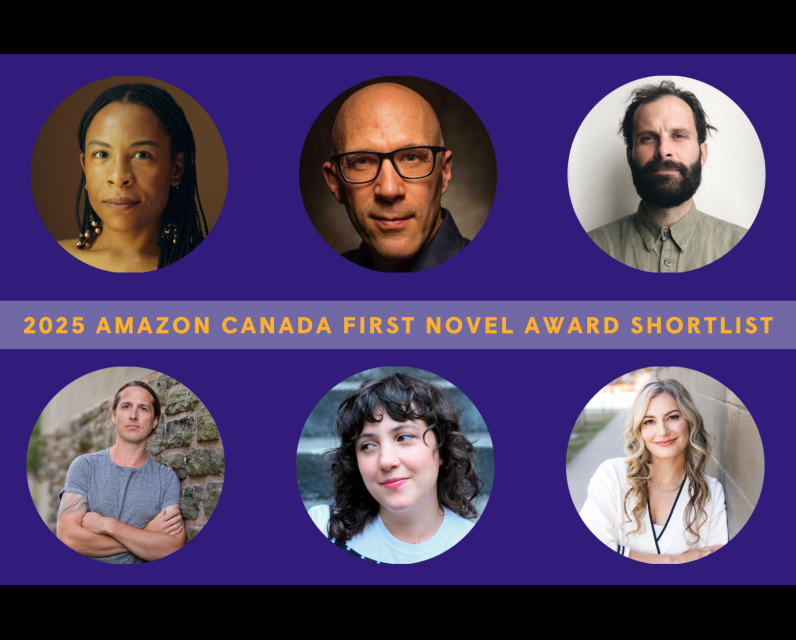Source Feed: Walrus
Author: The Walrus Lab
Publication Date: May 26, 2025 - 12:22
Winner Takes All
May 26, 2025

document.getElementsByClassName('th-hero-container')[0].insertAdjacentHTML('beforebegin', `
IN PARTNERSHIP WITH AMAZON CANADA
`);
document.getElementsByClassName("cat-links")[0].innerHTML = 'In Partnership with Amazon Canada';
.gallery {/*margin-bottom: 0; top: -40px; position: relative;*/}
div.gallery span.hm-tagged {/* margin: 0; */}
Some people—maybe the cynics among us—might argue that in order for someone to win, someone else has to lose. In the novels nominated for this year’s Amazon First Novel Award, this notion takes different forms: office friendships that stem from a major betrayal, relationship possibilities that collapse when one path is chosen, and the accumulation of wealth and land that pushes the environment and disenfranchised communities to the brink. We asked the authors: Between love, war, and societal chaos, how do the central tensions in your novel illustrate the zero-sum nature of life? Some obliged, while others refuted the winner-takes-all idea itself, instead suggesting that, in fact, there’s beauty and prosperity to be found amid the most devastating of losses.
“Oil People’s two protagonists, Jade and Clyde Armbruster, occupy wildly different vantage points on the oil age, and yet both are highly compromised by petroleum, powerfully beholden to it. Clyde, living at the beginning of the Lambton County oil boom in 1862–1863—where Canada’s oily history began, far from Alberta, on the very verge of nationhood—is drunk on oil, fiending for it, compelled by its dark, earthy mystery. For Clyde, petroleum is a marvel, a substance of scientific curiosity and a path to upward social mobility. It also causes the gradual ruin of his personal and family life, and stands in the way of his wife’s desire to reproduce.
Jade, who lives on the very same patch of land in 1987, beholds her ancestor Clyde as a plasticized replica, the founding daddy of the oil museum her home has become. Petroleum history thus becomes petroleum mythology (Jade lives off a road called Oil Legacy Lane). For Jade, oil is simply in the water. Early in the novel, her mother proudly tells her, “We’re oil people. It’s in our blood.” Jade is thirteen years old in the novel and, with the help of a rebellious older sister, she comes to understand her family’s complicity in this toxic industry and gains the courage to take on her family members and confront the Armbrusters’ nefarious past.”
– David Huebert, Oil People
“I don’t see life—or at least my corner of it—as having a zero-sum nature. But there’s one scene in When We Were Ashes that involves a dualism many of my readers have found startling.
After the children have been transported to Trutzburg, an old castle keep converted into a disguised euthanasia centre, they play a game of live-action checkers in the ward where they’ve been locked. They have nothing but themselves, and so each child becomes a piece in the game, which they play out on a tessellated stone floor. They hop over each other to capture other ‘pieces,’ they hold their arms over their heads when they’ve been ‘crowned’; they laugh and smile. This is the indomitable human spirit at play: the sunlight in us that authoritarian cruelty—try as it might, again and again across time and place—can’t extinguish.”
– Andrew Boden, When We Were Ashes
“How It Works Out’s Myriam and Allison, in all their multiversal incarnations, want so badly to love and be loved. But in almost every universe, their impulse to protect themselves gets in the way. To cure her depression, Myriam eats Allison’s flesh, setting off a cycle in which everyone gets hurt. Afraid that Myriam will leave her, Allison splits in two: a gentle, blue-skinned performance artist and her angry side. In her billionaire incarnation, Myriam wants so badly to fit in with Allison’s activist friends, but chooses profit and environmental destruction as soon as she feels rejected.
In the novel, we see that when hurt characters hurt each other, everyone loses. But in those moments when they risk it all for love, we catch a glimpse of how beautiful the world could be if everyone put their weapons down. We see infinite possibility.”
– Myriam LaCroix, How It Works Out
“A major throughline in I Hope This Finds You Well is the importance of connection, yet the tensions take place in a competitive office environment. When the main character gains access to all her colleagues’ emails, she at first sets out to use this newfound information to her advantage. Only in reading their private messages, she notices the disparity between how they present themselves at work versus who they are outside the office. As she’s drawn further into their personal lives, she begins to connect with them and form real friendships. Her inner conflict becomes that the friendships she so desperately needed all stem from a major betrayal. It explores how we present our lives and ourselves in different environments, and how authentic we can be with those who could use the information against us.”
– Natalie Sue, I Hope This Finds You Well
“Capitalism and militarism both function on an inner logic of expendability. In both the military-industrial complex and capitalist production, love, family, and friendship are desirable in service of profitability and mission success, but hold no intrinsic value apart. The able body and mind are desirable for the workforce, but when labour conditions or wartime violence damage both body and mind and render the individual incapable of production, the individual is likely to be discarded.
Juiceboxers is an exploration of friendship, masculinity, and belonging in the tall shadows of these social determinants, in the long shadow of the fallen towers. How do eighteen-year-old boys challenge, accept, or transcend them? How do they create or find kinship under these conditions? The novel is about these things, yes, but also about the inner and outer lives of teenage dirtbags from a northern city that is neither particularly beautiful nor noteworthy, with the exception of what was once the biggest mall in the world. This is a novel about small lives during a long war that is already in the process of being forgotten.” – Benjamin Hertwig, Juiceboxers
“Subterrane explores the fact that we are all delightfully and terrifyingly part of each other—that some of us may exist on the perilous margins or the crevices, but we also enjoy inalienable birthrights, like freedom, interdependence, and connection. No, my book does not embody the zero-sum nature of life. White supremacists would have us believe in ‘survival of the fittest’ or ‘us against them’—slogans that generate offshore border prisons and reduce humans to capital. So much pain is caused by a historical and organized refusal to live on the same plane of existence as the fungi at the foot of a tree and the particles in the ocean.” – Valerie Bah, Subterrane
To learn more about the authors and their novels, visit thewalrus.ca/afna
The post Winner Takes All first appeared on The Walrus.
Carney’s comments come after a three-judge panel blocked some of Trump’s signature policies, including the fentanyl and border security-related tariffs on Canada.
May 29, 2025 - 10:53 | Uday Rana | Global News - Canada
And with wedding season in full swing, couples tying the knot this summer might need to brace for a steeper bill, thanks to tariffs.
May 29, 2025 - 10:47 | Katie Dangerfield | Global News - Canada
There were sharp regional contrasts in Canada’s housing market in April, 2025, underscoring a growing disconnect between markets in Ontario and B.C. and those in the rest of Canada. The average national home price, MLS benchmark price and seasonally adjusted sales dropped 3.9 per cent, 3.6 per cent and 7.5 per cent year-over-year, respectively, driven by cooling demand in Ontario and British Columbia.
May 29, 2025 - 10:46 | Hanif Bayat | The Globe and Mail



Comments
Be the first to comment